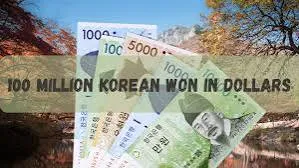Understanding the Won Currency in 2024: A Comprehensive Guide
The won currency is a topic that has garnered increasing attention in 2024, especially among economists, investors, and those interested in global finance. As the official currency of South Korea, the won holds a significant place in the Asian financial market, and its influence extends far beyond the Korean peninsula. This blog aims to delve into the won currency, its history, current trends, and its role in the global economy, all while maintaining a human touch to make the complex subject more approachable.
A Brief History of the Won Currency
The won currency has a rich history that reflects South Korea’s turbulent past. First introduced in 1902, the won replaced the Korean yen following the end of Japanese colonial rule. However, it was reintroduced in 1962 after the Korean War, replacing the hwan as part of South Korea’s economic stabilisation efforts. Over the years, the won currency has undergone several reforms, including denomination changes, to align with the country’s rapid economic growth. Today, the won is a symbol of South Korea’s resilience and economic prowess.
The Value of the Won Currency in 2024
As of 2024, the won currency has shown relative stability despite global economic uncertainties. This stability can be attributed to South Korea’s robust economy, characterised by strong exports, advanced technology, and a skilled workforce. However, like all currencies, the won is subject to fluctuations influenced by factors such as geopolitical tensions, inflation rates, and changes in global trade dynamics. Understanding the current value of the won currency requires keeping an eye on these factors, as they can significantly impact its strength and purchasing power.
The Role of the Won Currency in International Trade
South Korea is one of the world’s leading exporters, and the won currency plays a crucial role in its international trade. Products ranging from automobiles to electronics are exported globally, with transactions often settled in won. This makes the won currency a key player in global markets, especially in Asia. In 2024, South Korea’s trade relations, particularly with major economies like China and the United States, continue to influence the demand and value of the won. For businesses and investors, understanding the dynamics of the won currency in international trade is essential for making informed decisions.
Investing in the Won Currency
For investors, the won currency presents both opportunities and risks. As with any currency investment, the potential for profit lies in the currency’s exchange rate movements. In 2024, factors such as South Korea’s economic policies, interest rates, and global economic conditions will influence the won currency’s value. Investors should also consider the impact of South Korea’s political landscape and its relations with neighbouring countries. Those looking to invest in the won currency must stay informed about these factors and adopt a well-researched strategy to mitigate risks and maximise returns.
The Impact of Technology on the Won Currency
Technology has revolutionised the way currencies are traded, and the won currency is no exception. In 2024, digital platforms and fintech innovations have made it easier for individuals and businesses to trade won globally. South Korea, being a leader in technology, has embraced these advancements, further integrating the won currency into the digital economy. The rise of cryptocurrency and blockchain technology has also had an impact, with some speculating about the future of digital won. Understanding how technology influences the won currency is crucial for anyone involved in currency trading or looking to understand future financial trends.
The Future of the Won Currency
The future of the won currency in 2024 and beyond is a topic of much speculation. While it has remained relatively stable, future trends will likely depend on several factors, including South Korea’s economic performance, global economic conditions, and geopolitical developments. Additionally, the ongoing evolution of digital currencies could pose challenges or opportunities for the won currency. As the world moves towards a more interconnected and digital economy, the won currency will need to adapt to maintain its relevance on the global stage.
Conclusion
In conclusion, the won currency is more than just a medium of exchange; it is a reflection of South Korea’s economic strength and its place in the global economy. In 2024, understanding the won requires a nuanced approach, considering its history, current trends, and future prospects. Whether you are an investor, a business owner, or simply someone interested in global finance, staying informed about the won currency is essential. As the world continues to change, the won will undoubtedly play a pivotal role in shaping the future of global trade and finance.

.jpeg)
.jpeg)



.jpeg)
.jpeg)
0 Comments